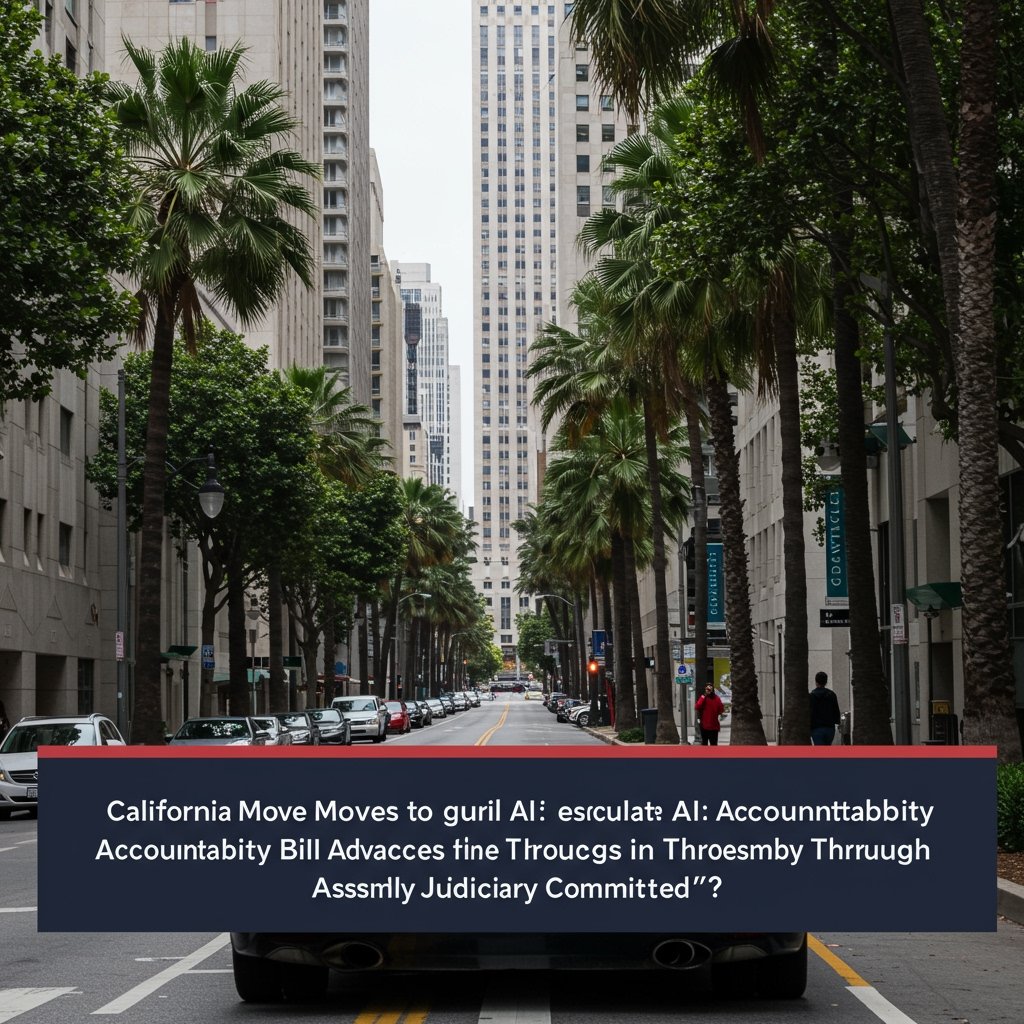California Lawmakers Advance Landmark AI Accountability Measure
Sacramento, CA – In a pivotal move signaling California’s intent to establish robust regulatory frameworks for artificial intelligence, a significant piece of legislation aimed at enhancing transparency and accountability in AI systems successfully cleared a key legislative hurdle. Assembly Bill 123, a measure championed by Assemblymember Lena Chen, passed the Assembly Judiciary Committee on April 15, 2025. The bill, often referred to as the “AI Accountability Act,” seeks to mitigate potential risks associated with powerful AI applications by imposing specific oversight requirements on developers and deployers.
This legislative action comes amid growing national and international discussions about the societal impact of artificial intelligence, particularly concerning issues of bias, fairness, privacy, and potential misuse. California, as a global hub for technological innovation, is taking a leading role in grappling with how to govern these rapidly evolving systems to protect its citizens while fostering responsible technological advancement.
Key Provisions of AB 123
The core tenets of Assembly Bill 123 revolve around mandating scrutiny for what the bill defines as “high-impact artificial intelligence systems.” These systems are identified as those deployed in critical sectors where algorithmic decisions can have substantial consequences for individuals’ lives and opportunities. The bill specifically calls out areas such as hiring processes, where AI might screen job applications or conduct initial interviews, and criminal justice applications, which could include risk assessment tools used in sentencing or parole decisions.
Under the proposed legislation, entities utilizing or developing these high-impact AI systems would be required to conduct annual algorithmic audits. These audits are intended to evaluate the system’s performance, identify potential biases, assess compliance with relevant laws, and ensure the system operates as intended without unintended discriminatory or harmful outcomes. The details regarding the scope, methodology, and reporting requirements for these audits would likely be further refined through regulatory processes established by the state.
Beyond the audit mandate, AB 123 proposes the creation of a new state governmental body dedicated to the oversight of artificial intelligence: the California Artificial Intelligence Review Board (CAIRB). This board is envisioned as the central authority responsible for developing regulations, interpreting the bill’s provisions, potentially overseeing the audit process, and serving as a resource for both industry and the public regarding AI governance. The establishment of the CAIRB underscores the state’s recognition that AI requires specialized expertise and dedicated resources for effective regulation.
To fund the initial operations and staffing of the CAIRB, Assembly Bill 123 allocates an initial budget of $10 million. This funding is intended to allow the board to begin its foundational work, including staffing up with necessary technical, legal, and policy expertise, and developing the initial guidelines and frameworks required to implement the bill’s provisions should it become law.
Proponents’ Rationale and Aims
Proponents of AB 123, led by Assemblymember Lena Chen, argue that the bill is a necessary step to proactively address the risks posed by powerful AI technologies. They contend that without clear standards for accountability and transparency, AI systems could inadvertently perpetuate or even amplify existing societal biases, leading to unfair or discriminatory outcomes in areas fundamental to individuals’ well-being and civil rights. The focus on high-impact systems in hiring and criminal justice reflects a particular concern for equity and due process.
The mandatory audits are seen as a mechanism to provide necessary visibility into the inner workings of complex algorithms that can often operate as ‘black boxes.’ By requiring regular, independent review, lawmakers hope to ensure that these systems are developed and deployed responsibly, with potential negative impacts identified and mitigated before they cause significant harm. The creation of CAIRB signifies an effort to build enduring institutional capacity within the state government to stay abreast of AI advancements and regulate them effectively.
Industry Concerns and Opposition
The passage of AB 123 through the Assembly Judiciary Committee was not without opposition. Representatives from the California Tech Industry Association, a prominent voice for technology companies operating in the state, have voiced significant concerns regarding the potential ramifications of the bill. They argue that the proposed measure, while perhaps well-intentioned, could have unintended negative consequences for California’s vibrant technology sector.
A primary argument from opponents centers on the potential for the bill to impede technological innovation. They suggest that stringent auditing requirements and the regulatory oversight imposed by the CAIRB could stifle the rapid development and deployment characteristic of AI and machine learning. Concerns were raised that the costs and complexities associated with complying with the new mandates could be substantial, particularly for smaller startups or companies with limited resources, potentially creating significant compliance burdens on businesses operating within the state.
The California Tech Industry Association contends that overly prescriptive regulations at this early stage of AI development could slow down progress and make California a less attractive place for AI research, development, and investment compared to other states or countries with less stringent rules. They advocate for a more flexible, potentially industry-led, approach to AI governance, emphasizing ethical guidelines and voluntary frameworks rather than mandatory audits and the creation of new governmental bodies.
The Path Forward
The successful passage through the Assembly Judiciary Committee marks a significant milestone for AB 123, but it is just one step in the complex legislative process. The bill must now move to other relevant committees within the Assembly for further review and potential amendments before it can be considered by the full Assembly floor. If it passes the Assembly, it would then proceed to the California State Senate, where it would undergo a similar committee and floor vote process. Should it pass both houses, it would finally head to the Governor’s desk for signature.
Debates surrounding AB 123 are expected to continue as the bill advances. Lawmakers will weigh the competing interests of fostering technological innovation and ensuring public protection and accountability in the age of artificial intelligence. The outcome of this legislative effort in California is being closely watched nationally and internationally, as it could potentially serve as a model or cautionary tale for other jurisdictions grappling with similar questions about AI governance.
Conclusion
Assembly Bill 123 represents a bold legislative attempt by California to get ahead of the regulatory curve on artificial intelligence. By proposing mandatory algorithmic audits for high-impact systems and establishing a dedicated oversight body, the state aims to proactively address potential harms and ensure that AI is developed and used responsibly. While industry concerns about innovation and compliance burdens are substantial, the bill’s proponents emphasize the critical need for accountability in technologies that increasingly shape societal outcomes. The bill’s journey through the legislature will reveal how California seeks to balance these competing pressures in defining the future of AI governance.



















